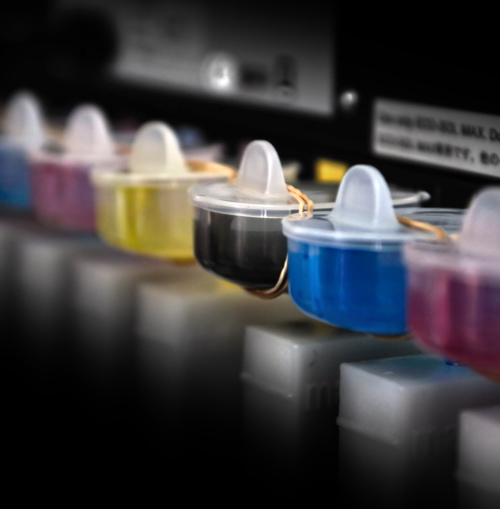I got a surprise this month. I was writing on “green” issues related to inkjet ink, and much of what I expected to write went out the window. [social_buttons]
In the world of offset printing, the difference between solvent-based inks and water-based inks matters—a lot. In the world of toner-based inks (digital inks), on the other hand, there really is no difference. As I’ve written here before, this is because nearly all toner-based inks are dry toner inks, which are solvent-free. Of those inks (liquid toner) that do contain solvent, it’s such a mild form that the practical difference is negligible.
But on the issue of inkjet, the issues are completely different. Solvent vs. water inks matters very little, but for completely different reasons.
In the choice between solvent- and water-based inkjet, neither is a good choice for environmental sustainability. The reason is that there are two aspects to the environmental equation that need to be considered: production and deinking/recycling.
From a production standpoint, water-based inkjet does eliminate VOCs. Win a point for water-based inkjet.
Then there is recyclability. While inkjet papers are recyclable, they are harder to de-ink. Largely, it comes down to the fineness of the pigments. These pigments are too small to be captured in the standard flotation process of deinking. Consequently, inkjet ink can leave visible residues (dirt specks) in the recycled paper, making such paper unsuitable for anything but the lowest grades. The second issue is that water-based formulations dissolve in water. This makes those pigments even more difficult to remove.
[social_buttons]
The challenge is illustrated by the recent formation of the Digital Print De-inking Alliance (DPDA), made up of HP, InfoPrint Solutions Company, Kodak´s Graphic Communications Group, and Oce N.V. The alliance was created to enable participants to jointly sponsor research on the recyclability of inkjet-printed paper. The fact that industry needs to create a task force to work on this issue suggests that it’s not the greenest process around. (Although HP claims some success—read the story from PrintWeek.)
For these reasons, INGEDE (International Association of the Deinking Industry) recommends that, from an environmental sustainability perspective, inkjet not be used for high print runs, such as newspapers, magazines, direct mail or inserts.
Like this article? Read through my archive of related posts.
Photo for this post courtesy of The Stock Exchange (photographer: ilco)





